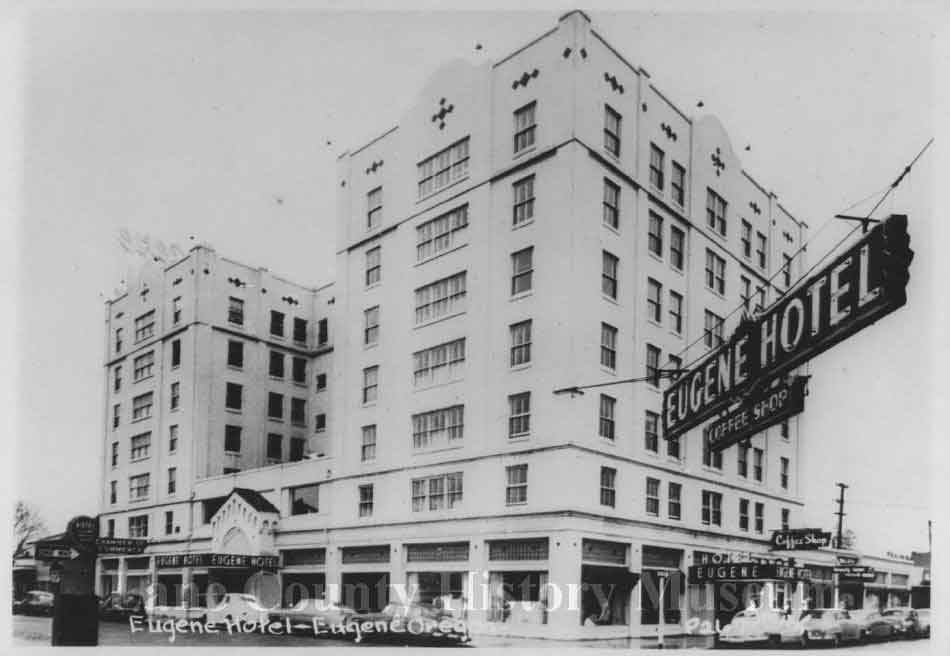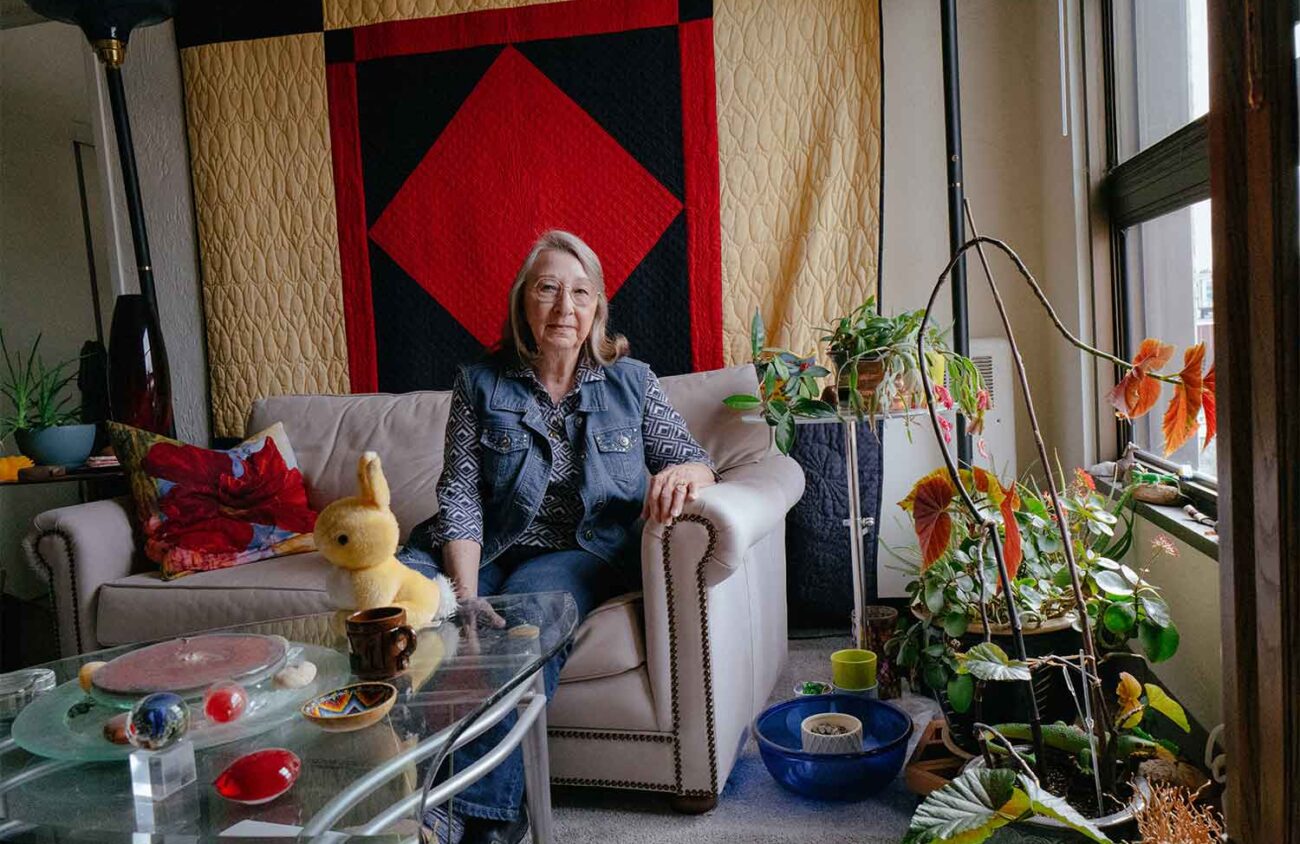The sun shines bright through the second floor window of the Eugene Hotel’s conference room. Inside, there’s a piano with sheet music framed from the American Songbook era and on the other side, a TV with movie posters of Indiana Jones and Casablanca.
Several of the residents are gathered around in a circle, some of whom have lived in the independent retirement center from a few months to several years. Many moved into the historic downtown building to be in a living space where they can have community and affordable housing.
But after an out-of-state corporation bought the building in 2022, many residents are seeing their rents hiked by 14.6 percent, the maximum allowed in 2023 under Oregon’s rent control legislation that Gov. Kate Brown signed into law in 2019.
The Eugene Hotel isn’t the only retirement center to be purchased by a corporation. It’s a nationwide trend as Wall Street corporations have taken over independent retirement centers. For many Eugene Hotel residents, the rent increase is far more than they budgeted for, they tell Eugene Weekly. Several residents have already moved out, and further rent increases may push other residents to look for other housing options.
Residents at independent living homes aren’t the only renters in Eugene and Oregon facing steep rent increases, and several Eugene Hotel tenants are lobbying and hoping the Oregon Legislature and Eugene City Council will pass renter protection policies.
“A lot of our residents have Social Security, a fixed amount with very small savings,” Eugene Hotel resident Beth Weldy says. “When they got hit with this 14.6 percent increase, some of them are now right on the edge of their income.”
Enlarge

Life at the Eugene Hotel
For nearly 100 years, the Eugene Hotel has stood in the heart of downtown. During its heyday as a hotel, it hosted Eleanor Roosevelt, Richard Nixon and Robert F. Kennedy (who would be assassinated in California the next day). And it’s the spot where John Belushi jammed with Curtis Salgado and the Nighthawks, which would go on to inspire the Blues Brothers Saturday Night Live skit and 1980 film.
For more than 40 years, the Eugene Hotel has been independent retirement living housing units, a place that has attracted tenants for its downtown location, community and reliable rent. But after the Bay Area investment firm purchased the property in 2022, tenants say they’ve seen rent go up hundreds of dollars per month. Now, tenants, many of whom rely on fixed incomes and lifelong savings, wonder whether they can afford to live in the Eugene Hotel.
It was in 1980 that the Eugene Hotel made its transition from luxury lodging to an independent senior living housing complex. At that time, Eugene’s downtown had been affected by the growing Valley River Center mall, according to the Eugene Hotel’s National Register of Historic Places Inventory nomination form.
The next year, Eugene Retirement Properties purchased the hotel, and the health care firm Brim and Associates converted it into a retirement center. The seven-story building has 104 residential units, most of which are one-bedroom, 511-square-foot apartments and studio apartments smaller than 370 square feet.
The Eugene Hotel is one of few senior independent living housing choices in town. Not all retirement homes are the same. If a senior adult wants to move into a retirement center, there are a range of housing types, from independent living like the Eugene Hotel to assisted living to nursing home settings.
In past years, Eugene Hotel tenants say, an agreement between tenants and management limited rent increases to around 3 percent, which matched Social Security cost of living adjustments. It’s an expense that adds to concerns about future medical bills, increases in Medicare and other expenses.
“What they didn’t take into consideration when they were comparing our rents with other facilities nearby is that we are a very old building,” Judy Bruns says. The Eugene Hotel doesn’t have the amenities of other downtown housing options, such as market rate apartments in the 5th Street Public Market. “We’ve put up with leaky windows, and the heating system is like there’s gnomes in the wall. And we have to buy our own bottled water because the water system isn’t great.”
The rent at Eugene Hotel does include one meal a day, group travel around town for activities, housekeeping and other amenities. But it’s not the services that the tenants are upset about; it’s that increased rent. Depending on the size of the housing unit at the Eugene Hotel, the rent increase adds from an extra $220 a month to $400. Bruns lives in a studio apartment at the Eugene Hotel, and after a $220 rent increase, she now pays $1,800 a month.
“Even though it wasn’t perfect, you know, in balance with everything else, it was a good choice for us,” resident Mel Ingeroi says about why he decided to live at the Eugene Hotel. “Another thing we don’t know, the 14.1 percent, is that a one-year catch up? What is the future? That’s what scares the lot of us.”
When many tenants moved in, they had the expectation — and budget — that rent would increase at a steady rate. And some of the Eugene Hotel tenants say they aren’t just budgeting for medical emergencies but also dealing with what they’ve lost in a turbulent Wall Street over the past few years.
“One of the things that is in the back of our minds — always — is a catastrophic health event,” Weldy says. “If we have to keep pulling from savings to meet rent, that leaves us even more anxious about how our health is.”
In 2022, DiNapoli Capital Partners, based in Walnut Creek, California, purchased the Eugene Hotel. According to the Bay Area company’s website, the investment firm’s strategy is focused on hotel, multifamily, office and senior housing investments. The company’s website portfolio shows most of its senior housing properties are in California. EW reached out for comment, but DiNapoli did not respond. The Eugene Hotel has been managed by the Lake Oswego-based Seasons Living since the purchase.
The seniors at the Eugene Hotel are far from alone in what is happening to them. More investment firms are buying independent retirement housing units as a way to add to real estate portfolios.
In 2022, the publicly traded real estate investment firm Welltower spent more than $1 billion to acquire nearly 100 retirement housing properties throughout the East Coast and Midwest.
In a Feb. 21 press release that announced that the Chicago-based investment group Greene Park Capital was launching its senior living investment portfolio, the company said now is the ideal time to invest in senior living. “The industry continues to emerge from the effects of COVID-19 as seniors and their families recognize the necessary and important role that senior living plays in their lives,” the company said. “Meanwhile, the pace of new development has slowed significantly, and the aging of America continues to accelerate dramatically.”
When former Eugene Hotel resident Sandy Whitaker found out that DiNapoli Capital Partners purchased the Eugene Hotel, she says she immediately called Eugene Abbey to move there, another downtown Eugene independent retirement center.
“I knew what they would do. They’re out of state; they don’t care,” Whitaker says of DiNapoli. “When a corporation gets involved, I’m gone. I’m not going to have a corporation from out of state dictate to me what kind of money they’re going to start charging for rent.”
It took Whitaker weeks to get a room at the Eugene Abbey. But now there’s uncertainty over the future of Eugene Abbey and its tenants. The longtime owners of the property, not-for-profit Christian organization Evangelical Lutheran Good Samaritan, announced in January that it would sell its facilities in 15 U.S. states, including Oregon. The organization that is slated to take over the Eugene Abbey is the Idaho-based Cascadia Healthcare.
Enlarge

Rent on the rise
The uncertainty over rent increases in 2024 and beyond is now an added strain for tenants of Eugene Hotel, but they aren’t alone in dealing with landlords charging the maximum rent increase allowed under Oregon’s rent cap.
Since the founding of Springfield-Eugene Tenant Association in 2020, Executive Director Tim Morris says that the nonprofit’s hotline workers ask tenants why they’re calling. Rent increase has always been a reason why tenants have called to ask about their rights or how to navigate an issue with their landlord.
During the first two and a half years of the COVID-19 pandemic, Morris says that there were significant renter protections in place to protect tenants. “Ever since the renter protections ended back in October, we saw that number rise,” he says about calls related to rent increases. “It seems that about half of the people that contact us are receiving the maximum amount of rent increases.”
From January to March this year, SETA reports that 47 calls were regarding rent increases, some from people reporting that they couldn’t afford it. Of those callers, 17 said that their landlords were increasing rent by 14.6 percent.
According to data from Zillow, the 2023 median rent for all types of housing in Eugene is $1,850, about $136 more compared to April 2022, and is $50 more a month than in Portland. By housing type, the median rent for apartments is $1,575 and single family housing units is $2,295.
In general, COVID-era renter protections had kept most landlords from increasing rent, but Morris says that this doesn’t mean they weren’t without government assistance to offset losses due to inflation. For example, landlords had access to Oregon’s Landlord Compensation Fund, Morris says, and that reached landlords faster than renter assistance was dispersed to tenants.
“I wish I could apply some type of logic to it. It is a nice logic that they couldn’t raise rents in the past two years,” Morris says of the argument that landlords are raising rent right now because they didn’t during the height of the pandemic. “But it’s just always been historically true that they raise rents.”
Reforming Rent
Like other renters, Eugene Hotel tenants have been active providing testimony to the Oregon Legislature and Eugene City Council, urging lawmakers and councilors to support rental protection policies, as COVID-19-era state laws have ended.
In 2022, the Eugene City Council passed its first phase of renter protections. But among those policies was a $10 cap on rental application screenings, which in January 2023 a Lane County judge said violated state law.
The council’s next batch of rental protections, which it last discussed at a March 13 meeting, include limiting the amount a landlord can require for a security deposit and displacement assistance. The city of Portland offers displacement assistance for any renter who has experienced a rent increase of 10 percent or more over a 12-month period, among other factors.
Senate Bill 611, which could lower Oregon’s rent cap, is one hope for tenants seeking some protection measures. Prompting the bill was the rent increases that Oregon tenants are experiencing, says state Sen. Sara Gelser Blouin of Corvallis, a chief sponsor of SB 611.
When legislators worked on the rent cap in 2017, the intent was to create a maximum rent increase threshold, but no one expected the consumer price index, a measure of inflation, would increase so much, leading to double digit rent increases, Gelser Blouin says. SB 611’s testimony has attracted a sizable number of renters calling for its passage, but landlords have outnumbered them. Gelser Blouin says SB611 will still allow landlords to raise rents. “But when you look at out-of-state corporations, that’s not who we hear about economic impact,” she says. “We hear a lot about the moms and pops, but these big increases are coming from for-profit big landlord firms.”
State Rep. Andrea Valderrama of Portland is another chief sponsor of the bill. She tells EW via email that all Oregonians deserve access to affordable and accessible housing, “yet Oregon is in a cost of living crisis and many families remain unhoused or are experiencing housing insecurity.”
Valderrama calls SB 611 a critical homelessness prevention strategy to protect seniors, families, individuals and communities throughout the state from rent increase and housing displacement. “By stabilizing rent, we can give people the economic stability and opportunity we all deserve,” she says.
Gelser Blouin says SB 611 should be voted on in both chambers. As EW went to press, the bill’s latest update was on April 3 when it passed the Senate Committee on Housing and Development 3-2, with the Republican Sens. Tim Knopp and Dick Anderson dissenting. The bill was initially written to cap rent at 8 percent, but it has since been amended to have a cap at 10 percent.
“That would help all of us breathe a little bit easier,” Weldy says of SB 611. “We could figure out our budgets and understand where we would be — if we can afford to stay.”
In the meantime, the uncertainty of rent increase at the Eugene Hotel has residents wondering about their next steps. Some are fortunate enough to be able to weather further rent increases or have family to move in with. But the others may have to pursue other housing options, such as competing against other renters in a tight rental market.
“The worst case scenario is that some would actually become homeless,” Eugene Hotel resident Ingeroi says. “That’s not that extreme if you have four different rent increases, year after year.”
